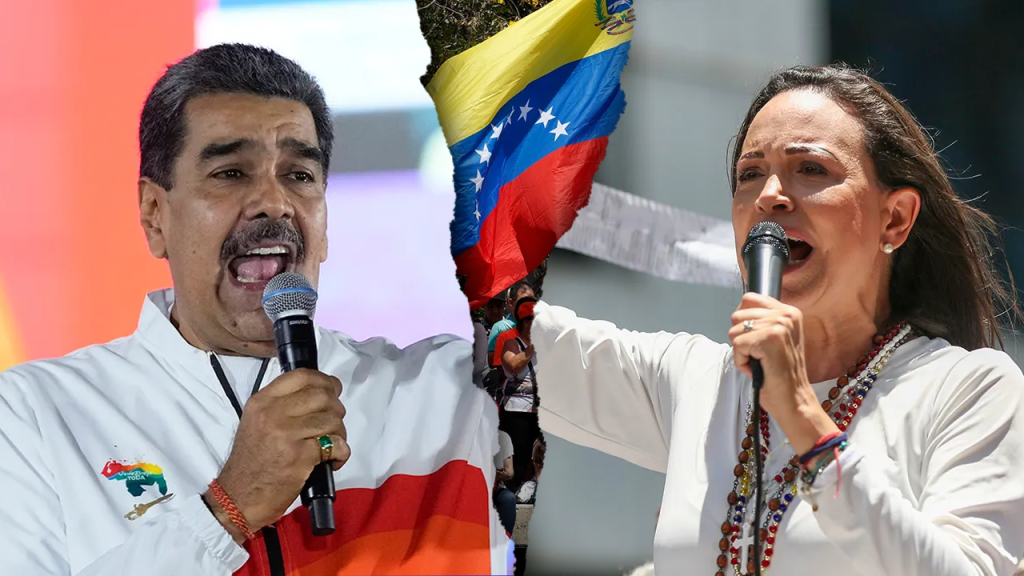The Venezuelan political landscape is fraught with tension following the disputed inauguration of Nicolás Maduro for a third presidential term. Despite widespread condemnation of the election results, both domestically and internationally, which point to opposition candidate Edmundo González Urrutia as the victor, Maduro has solidified his grip on power, sparking fears of escalating violence and mass migration. Opposition leader María Corina Machado, recently released after an alleged kidnapping by authorities, has called for public demonstrations to demand González’s rightful installation as president, setting the stage for a direct confrontation with the Maduro regime. The potential consequences of this political standoff extend far beyond Venezuela’s borders, with significant implications for regional stability and the security of the United States.
Machado’s warnings paint a grim picture of the future under continued Maduro rule. She predicts a mass exodus of Venezuelan refugees, potentially numbering in the millions, seeking refuge in the United States. This influx would exacerbate the existing migration crisis and strain resources along the southern border. Furthermore, Machado emphasizes the connection between Venezuela’s political instability and the security of the American people, highlighting the urgent need for a resolution to the crisis. She argues that a stable and democratic Venezuela would not only stem the flow of migrants but also enable the voluntary return of those who have already fled, fostering economic recovery and regional security.
The potential for increased violence within the United States is another pressing concern. José Gustavo Arocha, a former Venezuelan military official who has sought asylum in the U.S., warns of the growing threat posed by the Tren de Aragua (TdA), a brutal transnational gang with ties to the Maduro regime. Arocha contends that Maduro may utilize the TdA as a tool of coercion and asymmetric warfare against the United States, leveraging migration flows and gang activity to destabilize the country and pressure for the easing of sanctions. He believes Maduro will intentionally fuel chaos and repression within Venezuela to drive further migration, strategically embedding TdA members within the migrant population to expand the gang’s reach and influence within the U.S.
This dire assessment is echoed by Alberto Ray, a security strategist working with Machado. He describes the situation in Venezuela as “extremely explosive” and warns of a direct correlation between Maduro’s continued rule and the expansion of TdA operations in the U.S. Ray emphasizes that while the vast majority of Venezuelan migrants are law-abiding individuals seeking a better life, the Maduro regime is actively weaponizing migration to sow discord and instability. By embedding criminal elements within migrant flows, Maduro aims to create chaos and pressure the U.S. government. Ray believes that stopping Maduro is the key to reversing this trend, anticipating a return of Venezuelan migrants once stability and democratic governance are restored.
The TdA’s presence within the U.S. poses a significant security threat. Their activities, ranging from kidnapping and torture to extortion and territorial control, mirror the gang’s modus operandi in Venezuela and other countries in the region. The influx of TdA members alongside legitimate migrants creates a complex challenge for law enforcement agencies, requiring increased resources and intelligence gathering to combat the gang’s growing influence. The potential for the TdA to establish deeper roots within the U.S. criminal underworld raises concerns about increased violence, drug trafficking, and other illicit activities, further destabilizing communities and undermining security.
The Venezuelan crisis demands immediate attention from the international community. Ray calls for a strong stance against the Maduro regime, urging the U.S. government to shed light on the situation and enforce existing sanctions rigorously. He stresses that the next few days are critical and that support for the Venezuelan people’s democratic aspirations is essential not only for their own well-being but also for the security of the United States. He underscores the stark contrast between the vast majority of Venezuelans seeking democratic change and the small, entrenched faction clinging to power, highlighting the need for international pressure to tip the balance in favor of democracy and stability. The potential for further violence, mass migration, and the expansion of transnational criminal organizations like the TdA underscores the urgency of the situation and the need for a coordinated international response to avert a deepening crisis with far-reaching consequences.

